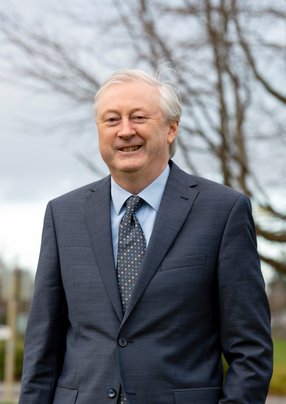
Martin Curley
Director of Digital Transformation and Open Innovation at Health Service Execuitve

The Health Service Executive, or HSE, has been running all of the Republic of Ireland’s public health services since 2005. The publicly-funded healthcare system operates under the HSE Code of Governance, designed to ensure that the organisation stays on course in the provision of safe, high-quality health and personal social care.
Martin Curley, the director of digital transformation and open innovation at the HSE, is tasked with bringing digital transformation while maintaining the vision for a healthier Ireland with a high-quality health service.
"Together with other professional, physician and patient leaders, we were able to mobilise a national movement around large tech, small tech, clinicians, academics and patients. We now have 50 living labs across the country,” Curley says with pride.
Home hospitals
As one of his goals in reforming Ireland's healthcare system, Curley aims to essentially bring hospital care into homes, allowing patients to receive care in the setting in which they feel most comfortable, something that has been noted as improving patients’ long-term health trajectories and outcomes – particularly in reference to mental health and wellness.
"In the future, as many as 50% of people may prefer to be treated in their home over being in a hospital. This will solve a really big problem for the healthcare system,” he says, adding that providing health monitoring systems for personal use would not only improve health, but also lower costs.
According to Curley, technology could be further used to improve global healthcare systems, with current advancements in healthcare technologies potentially increasing average life expectancy by two years every five years.
“Using the internet of things, artificial intelligence, and cloud computing, we can make a real change that hasn't been seen before," he says.
"We don't necessarily need to put more money into healthcare, actually. It is much more pivotal to invest in lifestyle and behavioural changes around nutrition and exercise and associated digital therapeutics. They're much more impactful. We recently created a living lab (Health Elevator with CarePlus Pharmacies, FullHeallthMedical, PatientsKnowBest and others such as Fitbit) where you can get a health assessment, a personal electronic health record, and a wellness device." This enables proactive wellness management by the patient and the opportunity to identify early risk factors that can be dealt with, potentially saving 10x suffering and lifetime costs.
Curley says the HSE also aims to empower patients with autonomy and self-control via its 50 living labs. The technologies incorporated in the labs are, according to Curley, engaging, empowering, and encouraging patients.
"We're now expanding the Health Elevator Lab to firstly 500, and then to 5,000 people for the price of two to three cups of coffee per person," he says.
Tunstall Emergency Response have run a very successful remote chronic disease monitoring service together with Age Friendly Ireland, HSE Digital Transformation, Wexford County Council and Waterford Institute of Technology. Based on the outstanding success, the pilot is now being extended to four neighbouring counties. Tunstall, led by CEO James Doyle, is one of the unsung heroes of the Irish Digital Health revolution, now supporting about 50,000 older Irish citizens to live safely in their homes through remote monitoring.
Irish Digital Health SME ‘Alwayswithyou’ has created a ‘Hospital at Home’ living lab together with leading Irish care company Comfort Keepers and can provide a hospital-at-home service for a fraction of the cost of an overnight stay in an acute hospital.
Keeping people safe and well at home makes both health and economic sense.
Speeding up in Ireland
According to Curley, despite the progress, the country is still behind the rest of Europe in terms of healthcare.
“We are lagging in Europe, with respect to healthcare. We have the highest acute occupancy rate across Europe, at more than 96%. We were, until recently, ranked lowest in Europe for telehealth but we're making very good progress and are now ranked at number 5 by the OECD for telehealth,” he says.
Ireland currently has a national healthcare strategy called Sláintecare, which was developed by both the Department of Health of Ireland and HSE and was agreed and adopted by all parties in the Irish Dail (Parliament), following an all-party committee led by Rosin Shortall TD, produced an initial statement of strategy. The programme aims to build equal access to services for every citizen of Ireland, treating patients based on their needs instead of their ability to pay.
"We've now leapt from having a lagging respiratory measurement system to one with world-leading capabilities with a company called PMD Solutions and their product, RespiraSense. We have just deployed this RespiraSense technology into the community in Donegal with Prof Vera Keatings and Antoinette Doherty hoping to avoid frequent hospitalizations of patients with COPD. We're also deploying vital signs automation to over 20 hospitals, and we're doing some really remarkable work in other living labs,” says Curley.
He also claims that patients treated in the remote care living labs felt "a lot more secure and looked after. They are actually monitored maybe a hundred times a year, rather than eight," he says, adding that the monitoring costs are reduced by a factor of 10.
"So many healthcare organisations exhibited dynamic capabilities as a response to COVID, where they dramatically reconfigured themselves to perform mass-scale testing and mass vaccination,” he says. “We need that same kind of agility to respond to an opportunity, which is to legitimately transform healthcare through a digital approach."
Read the full story HERE.




